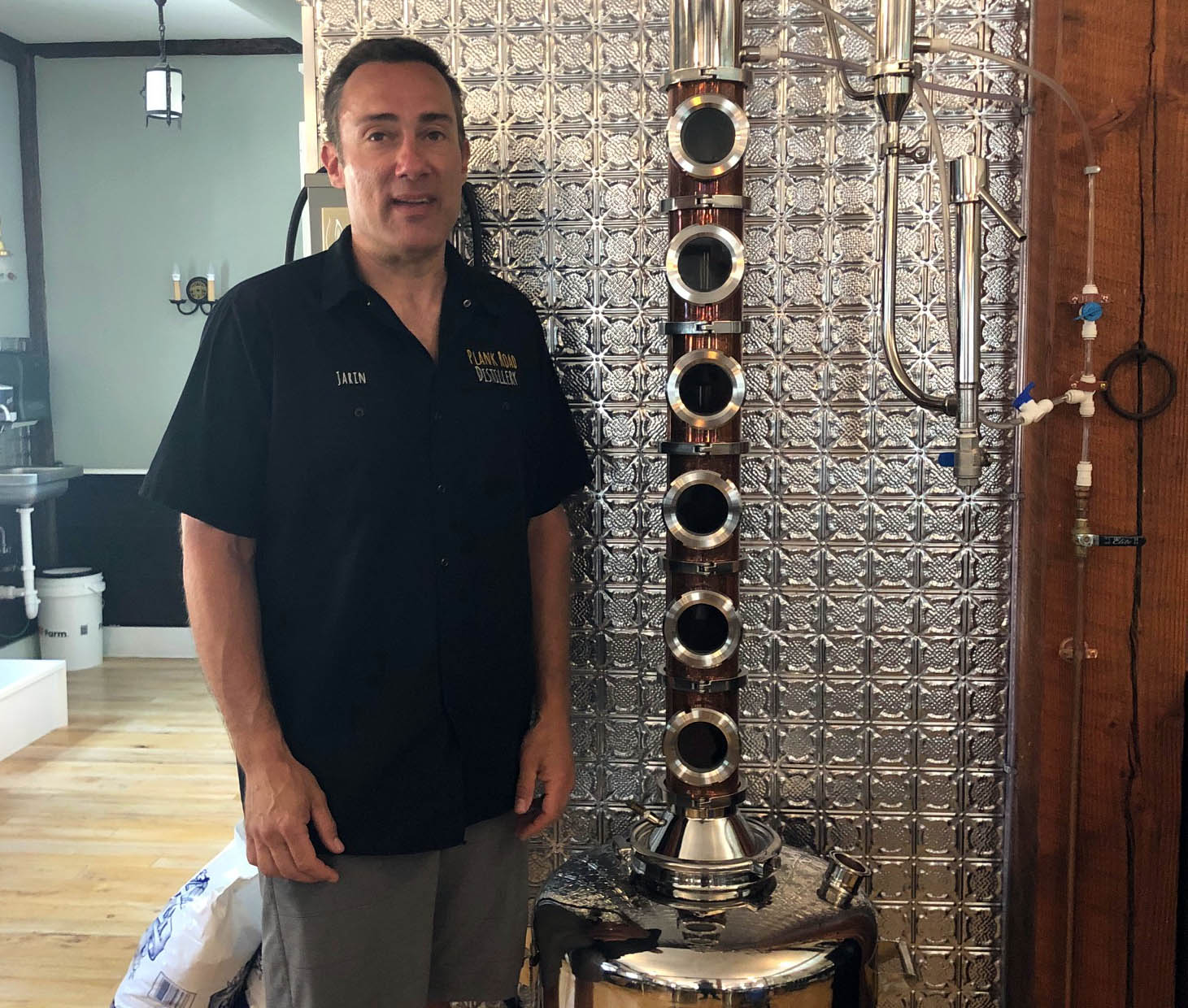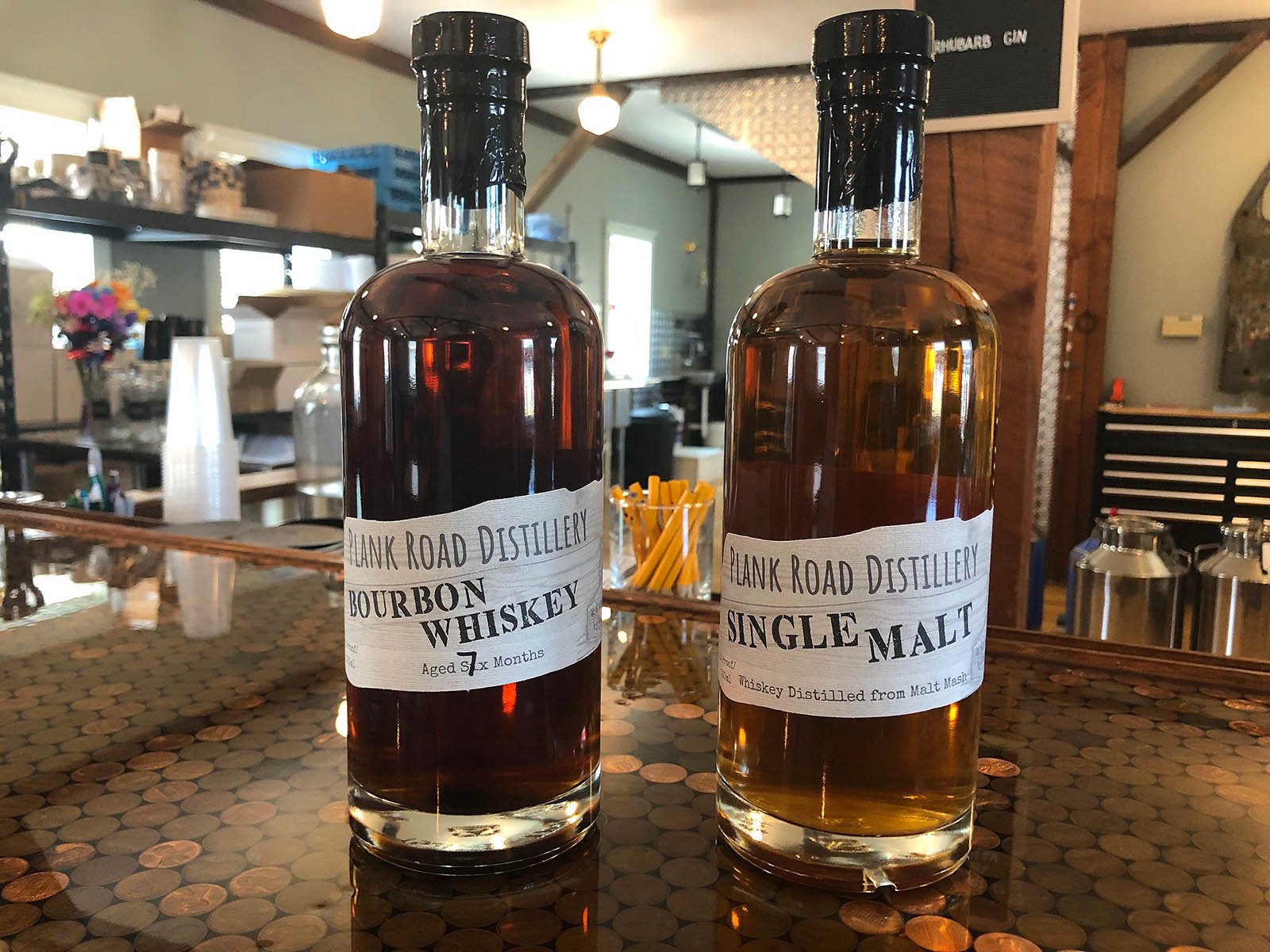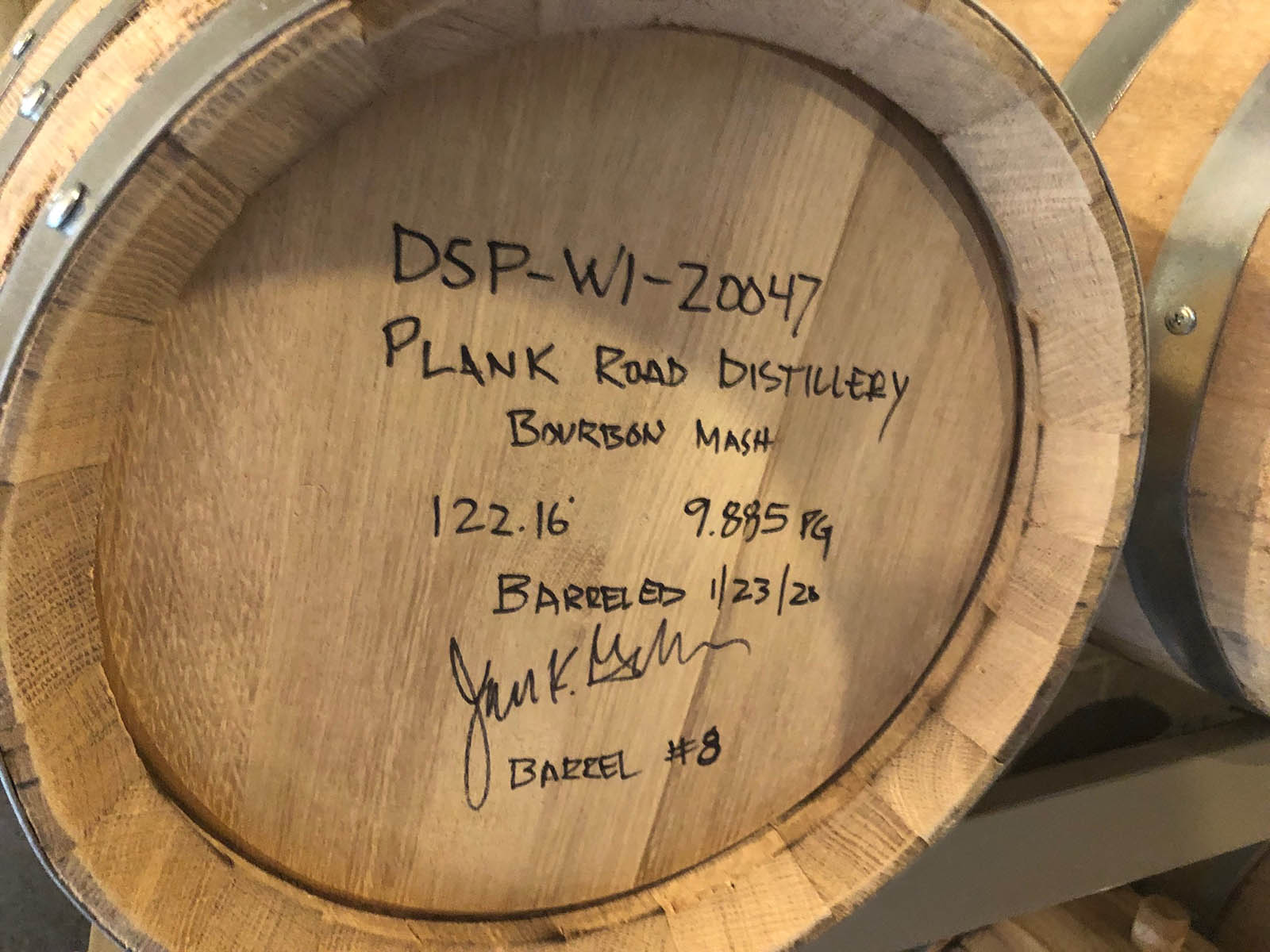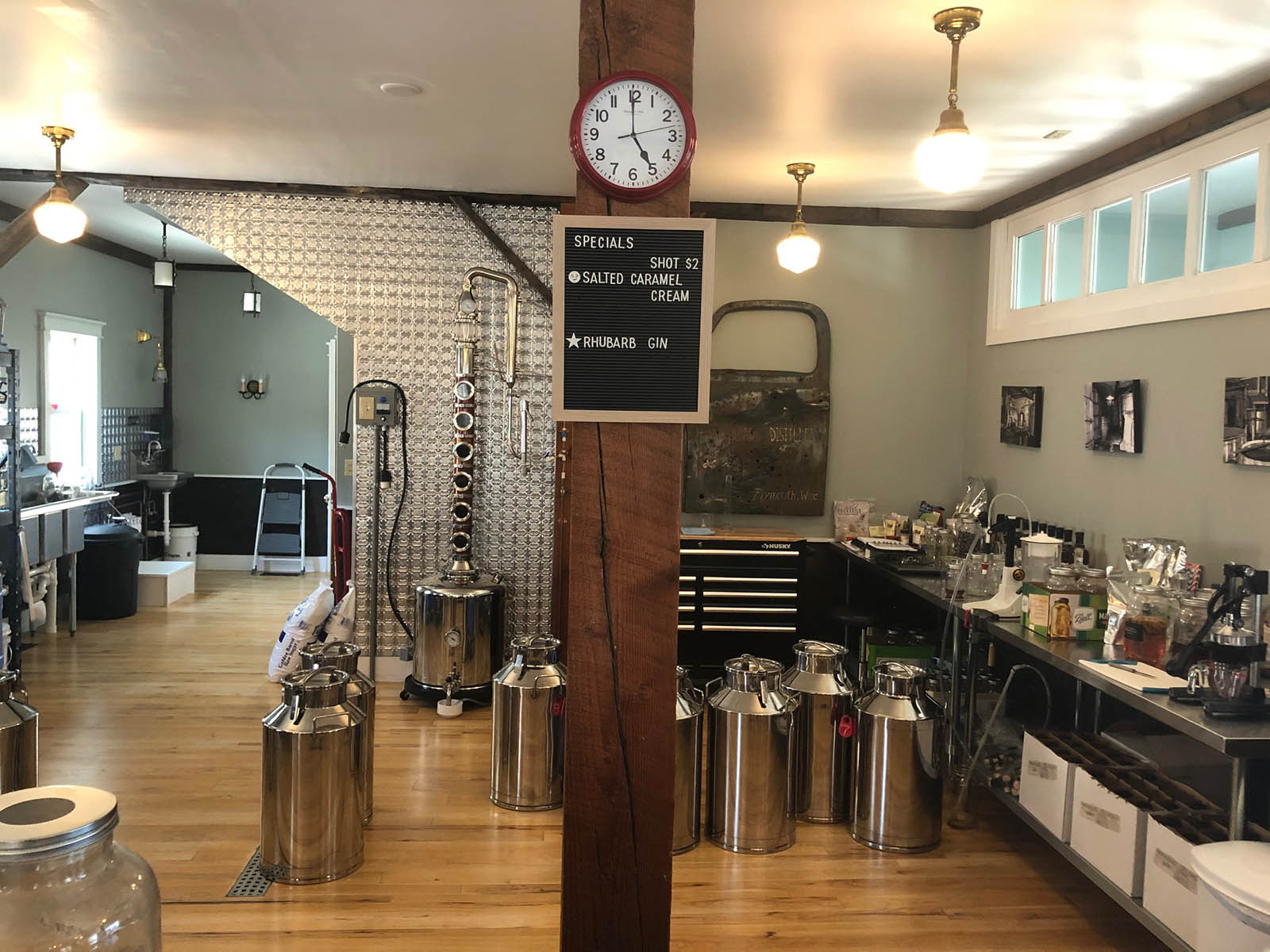The boom in craft distilling – and craft brewing, too – has been served with a chaser of big ambition.
Distilleries open with big plans and often with room for the growth they hope is just over the horizon. More capacity to be able to fill more barrels to create more styles of whiskey and other spirits.
At Plank Road Distillery at 601 Eastern Ave. in Plymouth, about an hour north of Milwaukee, the still is small, the space is small, the output is small and that’s just fine with owners Jarin and Michele Gelhar.

"I think we're probably the newest, we're certainly the smallest distillery in the state," Jarin says as he stands next to a still that is barely taller than he is.
Plank Road opened in June 17, 2019 in an 1846 building that is the oldest surviving stagecoach inn along the Plank Road that connected Sheboygan and Fond du Lac. It’s even older than the nearby and more famous Wade House in Greenbush.
"Our business model was a 100 percent contrarian to all other distilleries," says Gelhar. "We didn't want to pour millions of dollars of other people's money into the business. We are not in distribution and we have no intention of signing a contract. We're going to play the long game and hope that the state legislature will do the right thing and change the distribution laws.
"And then we'll just be still local. Our business model is a 20-, 25-mile radius around here. That's it. There's great hooch in Milwaukee already? I don't need to compete with Great Lakes, or Central Standard or Twisted Path. Those guys all do their own thing."
While the Gelhars are more than happy to host you and hope you’ll make the drive up from Milwaukee or stop in when you’re in the Plymouth area, they’re not counting on us.
"We do cater to that (business), but what we really want is a local following and we’ve built a strong local following already. I need somebody in February to come and patronize just so I can pay my electric bill in February, when nobody's coming here to play golf, or go to the race track, or do any of the other fun things that Sheboygan County offers."
The Gelhars are deeply invested in their community.
He holds up a rocks glass with "Plank Road Distillery" etched on it and says a company in a nearby town does that work.
He lifts a bottle of whiskey and says all their labels are printed right in Plymouth.
And because it’s a small operation without the space and equipment to do mashes for distiller’s beer, that work is contracted out to SwitchGear Brewing in Ekhart Lake about 20 minutes away.
"We’ve put down roots in Plymouth," he says. "We love this area."
Michele Gelhar keeps a day job at a local manufacturer to ensure a steady paycheck and the health insurance a family needs. The Gelhars have three sons, ages 19, 20 and 22.
"We are at that interesting time in our lives where we're borderline empty-nesters," says Jarin Gelhar, a former mechanical engineer, who grew up in Green Lake. "This is something that we kind of noodled on for about seven years. Finally, wrote the business plan, been to a lot of distilleries."

He says that he and Michele like to travel and to seek out unique local restaurants and breweries and distilleries; "the place that only the locals know about.
"And we said, ‘It'd be fun to be that place sometime.’ So we got to thinking and we said, ‘Well, there's good breweries and wineries in the area. There's great distilleries in Madison, Milwaukee, Door County up in the Fox Valley, Wollersheim, et cetera. Right? But there's nothing right here in this area. So being underrepresented, we saw an opportunity, we thought, and decided to go for it."
As you’d expect, Plank Road started out with vodka, gin and rum to start cash flow while a bourbon and a single malt whiskey aged in barrels in the basement.
"That's how we launched the business," says Gelhar, "and we said the goal is all the spirits need to be able to stand on their own with an ice cube, and then we make fun drinks. The spirits all have to be good enough to stand on their own. We're not trying to disguise bad spirits."
In order to give the whiskey program a nudge forward, Plank Road uses 15-gallon barrels from Black Swan Cooperage in Minnesota, which honeycombs the insides to increase the surface area that comes into contact with the whiskey, helping to get more oak, more flavor, more color, more quickly.

While some older distilleries might scoff at such techniques, they’re not unheard of in craft distilling where the economics of survival require a little push.
And, it’s working with customers.
"We can't keep our bourbon on the shelf. So we do a six-month aged bourbon," says Gelhar. "The bourbon is a very traditional mash recipe with slightly higher rye content because I like the spicy note of the rye. That's a personal preference for me."
Though he won’t disclose the mash bills of his bourbon, Gelhar says the single malt is 100 percent toasted barley.
"There's five different toasts in there," he says. "We got a chocolate, a caramel, a Munich aromatic, a lemongrass, which is the extra special from Briess, and pale ale. They're all fermented and distilled as one, and then we age that for three months in our used bourbon barrel. It's pretty unique."
The seventh batch of bourbon was released on the distillery’s first anniversary in June and batch eight followed expected later in summer. The response to each release has been the same.

"We sold out of batch seven later that day," says Gelhar. "So our first batch of bourbon, site untested, we had a line out the front door, along the sidewalk, down around past the stop and go light. We sold out in 25 minutes. The second sold out in 15 minutes. For batch three we had a guy lined up with a 20-pound propane tank and a screw-in heater. It was wintertime and he wasn’t even the first one in line."
Of course, the batches are only 40 to 50 bottles, but they’re flying out the door.
"I'm very unapologetic for that (batch size). We undershot the bourbon demand curve because being our first view and aging it, you don't know if you've got the right barrel, you don't know if the recipe's right. You don't know what's going to happen. For me it hit my expectations, and then the demand has just been insane."
Plank Road is aging between nine and 12 barrels at any given time and with its current capacity it will never get to the point at which it can offer a four-year whiskey.
"Right now we're just doing six month and we’re selling out every time," says Gelhar. "Batch seven we aged an extra month. With the (honeycomb, 15-gallon) barrels six months kind of correlates to like a two-year flavor profile seven months then is almost three years. But I lost a lot more to the angel's share in the extra month in a little barrel.

"I lost an extra 10 to 15 percent, .so it's hard for me to convince myself that that's a good idea when I can sell out of the six month in a day or less anyway. And I can't fill (a more standard 55-gallon barrel) my current setup. It’s too small."
Basically, a batch on the current still – made by Mile High Distilling in Colorado – fills one 15-gallon barrel.
"That's all scaled, the very engineer in me kind of figured that all out," Gelhar says. "So there's the good thing about the 174-year-old building though is there's enough infrastructure. So I do have 400 amps of electrical, I've got plumbing. So I can very easily add another still. That would be our growth pattern would just be to add another one of those and double our capacity (rather than) go into a bigger still."
But, right now, Plank Road is still trying to figure out how much it can (and wants) to grow in the whiskey game.
"At some point I’ll hit whatever that demand curve is," Gelhar says, "but we haven't hit it yet. It creates a lot of buzz. If you hit it, would you still get a line of people?"
And, if the bourbon is sitting on the shelf and a customer can walk in at any time and grab a bottle, does that lessen the urgency of coming over on release day to grab an extremely limited run?
"Right," says Gelhar, "Where's the fun in that? We didn't do that on purpose. Because we just said, ‘There's a liquor store. There's a couple of grocery stores. I mean right here.’ You can go get bottles of bourbon as much as you want."
But, people want Plymouth-made bourbon.
"Exactly," says Gelhar, "and who knew?"
Well, the Gelhars did.
They also know folks want vodka, gin and other spirits made right in town.
The vodka is 100 percent non-GMO corn-based and is distilled seven tmes before being carbon filtered at the still.
"(Other distilleries) are doing it at room temperature as a liquid," Gelhar says, "we fill the glass chamber up here with activated charcoal and we forced the spirit through the charcoal. So we're distilling, we're filtering as a vapor and at 180 degrees. Smaller molecule, higher temperature, better chemical reaction, takes away the vodka bite. I think Reyka out of Iceland is maybe one of the only other ones that does it that way."
The gin is the same as the vodka, distilled six times and then steeped in botanicals and then distilled a seventh time through the botanicals.
"We do both. So it truly is a distilled gin. I don't care for a piney gin, so we worked pretty hard to get rid of the pine needle notes. It's juniper-forward, like gin should be, but it's got kind of a citrus-y smooth finish to it."
There’s also a rum distilled from blackstrap molasses and raw sugar and it’s distilled with coconut.
"As far as I know, we're the only distillery in the state that makes it tequila," Gelhar says. "We can't legally call it tequila because it's not a product of Mexico, but we import blue agave nectar from Mexico, ferment it and distill it right here. Ffor our anniversary party, we released the aged agave.
"We use this extra small (virgin) five-gallon barrel and we aged it four months in the honeycomb, same thing, so that's kind of got some bourbon sugary, oak-y, smokey notes, but there's a definite agave note. So you know that it's tequila."

The tasting room was recently closed while the Gelhars did some unexpected renovations on the building, which had gotten a pretty heavy overhaul before it opened last year. But it still feels like the vintage building that it is.
"This is actually the oldest building being used commercially in Plymouth," says Gelhar. It was the old Flint House. There would have been a bar, there would been rooms for rent. In 1848, business was so good they built a new inn kitty corner, where the art center is, and sold this to a blacksmith, (who) added the lean-to."
Upstairs where the rooms for rent would’ve been is now an office and an overflow seating area. In the basement, where the barrels are, you can see the original foundation and support beams. Soon, just outside the large barn door leading out of the basement, there will be a new patio and deck.
For now, there’s just the tasting room inside.
"We're not open every day," says Gelhar. "On Wednesdays now we’ll open for a couple of hours for liquor sales. Thursday we do seating in the bar from 4 to 8. Friday it'll be from 4 to 9. Saturday will be 3 ‘til 9, maybe a little sooner.
"We stop serving at 9, and everybody respects that because we can't sell bottles past 9. And we're not interested in that 10 o'clock to 2 o'clock crowd at the bar, it's just not that kind of place."
Though the tasting room shut down during the pandemic, the Gelhars made some hand sanitizer and kept producing their spirits to sell on a carryout basis, and business has been good.
"Pre-COVID, we had as many as 50 people in this little (tasting room)," says Gelhar. "We reopened after the county said that it was okay.
"We've tried to follow Sheboygan County's guidance, and so we are at 50 percent capacity with some spacing. We don't allow anybody to stand. If you can't find a seat or if you're not comfortable, then you’ve got to go. We're fairly unapologetic for that."
Born in Brooklyn, N.Y., where he lived until he was 17, Bobby received his BA-Mass Communications from UWM in 1989 and has lived in Walker's Point, Bay View, Enderis Park, South Milwaukee and on the East Side.
He has published three non-fiction books in Italy – including one about an event in Milwaukee history, which was published in the U.S. in autumn 2010. Four more books, all about Milwaukee, have been published by The History Press.
With his most recent band, The Yell Leaders, Bobby released four LPs and had a songs featured in episodes of TV's "Party of Five" and "Dawson's Creek," and films in Japan, South America and the U.S. The Yell Leaders were named the best unsigned band in their region by VH-1 as part of its Rock Across America 1998 Tour. Most recently, the band contributed tracks to a UK vinyl/CD tribute to the Redskins and collaborated on a track with Italian novelist Enrico Remmert.
He's produced three installments of the "OMCD" series of local music compilations for OnMilwaukee.com and in 2007 produced a CD of Italian music and poetry.
In 2005, he was awarded the City of Asti's (Italy) Journalism Prize for his work focusing on that area. He has also won awards from the Milwaukee Press Club.
He has be heard on 88Nine Radio Milwaukee talking about his "Urban Spelunking" series of stories, in that station's most popular podcast.







